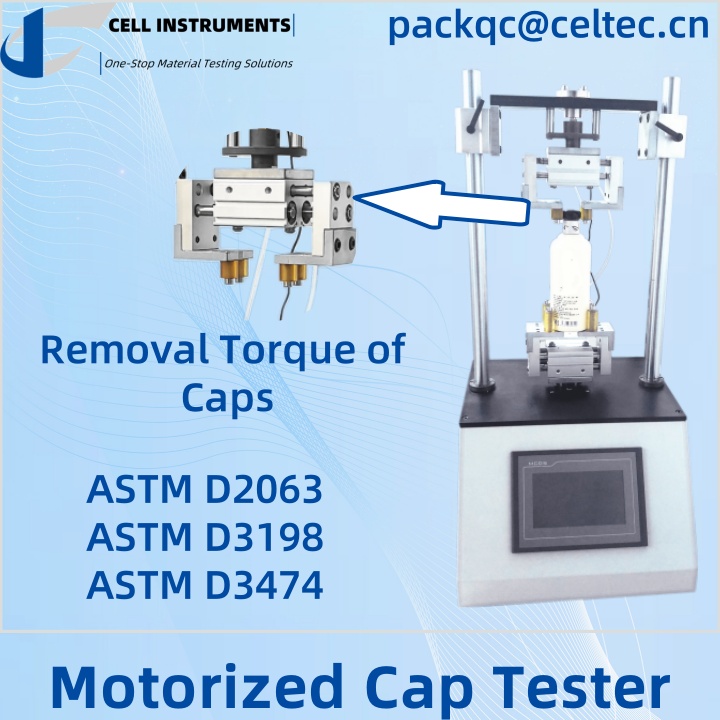Motorized Cap Tester: Key to Consistent Removal Torque of Caps
The motorized cap tester is a pivotal tool for industries reliant on precise torque measurements to ensure the integrity of their products. This instrument measures the force required to open or close caps on containers, ensuring that the torque is neither too tight nor too loose, thus maintaining product safety and quality.
Importance in Various Industries
Cap torque testers are vital across numerous sectors:
- Packaging: Ensures proper sealing to prevent leaks and contamination.
- Pharmaceuticals: Maintains product integrity and safety by securing medicinal containers.
- Beverages: Keeps carbonation and freshness intact.
- Cosmetics: Prevents spillage and ensures consistent quality.
- Household Chemicals: Ensures safety by maintaining appropriate sealing.
Benefits of Using Cap Torque Testers
Motorized cap testers offer several advantages:
- Quality Assurance: Ensures products meet stringent quality standards, minimizing customer complaints.
- Safety: Prevents under-tightened caps that could cause leaks or contamination and over-tightened caps that are hard to open.
- Compliance: Adheres to industry standards such as ASTM D2063, ASTM D3198, and ASTM D3474.
- Efficiency: Automates the testing process, saving time and reducing human error.
Key Features and Specifications
Modern motorized cap testers, like those from Cell Instruments, come equipped with advanced features:
- PLC Controlled Unit: Ensures stability with an intuitive HMI touch screen interface.
- Auto Clamping and Rotating Capability: Simulates production line environments for real-world applicability.
- Measurement of Locking and Opening Forces: Provides comprehensive data on cap performance.
- Automatic Peak Value Retention: Captures the highest torque value for accurate assessment.
- Multiple Units of Measurement: Displays results in various units for versatility.
- Overload Protection and Auto-Zeroing Function: Enhances safety and accuracy.
- RS232 Port and Professional Computer Software (Optional): Facilitates advanced data analysis.
Test Methods
Overview of Cap Torque Testing Procedures
- Preparation of Samples: Ensure caps and containers are clean and undamaged.
- Setting Up the Tester: Adjust settings according to specific test requirements.
- Performing the Test: Use automatic clamping and rotating functions to test the cap.
- Interpreting Results: Analyze the torque measurements to ensure compliance with required standards.
Types of Tests
- Application Torque Test: Measures the force required to apply the cap.
- Removal Torque Test: Measures the force required to remove the cap.
- Application/Removal Torque Test Cycle: Tests the cap through multiple cycles for durability.
Relevant ASTM Standards
ASTM D2063: Focuses on the measurement of torque retention for packages with continuous thread closures. This standard outlines procedures for sample preparation, testing, and data interpretation, providing guidelines for assessing compliance with torque retention requirements.
ASTM D3198: Specifies methods for measuring the application and removal torque of threaded or lug-style closures. Detailed procedures ensure accurate torque measurement, helping determine if torque values fall within acceptable ranges.
ASTM D3474: Offers guidelines for the calibration and proper use of torque meters in packaging applications. It describes calibration procedures and best practices for maintaining accuracy.
Applications
Industries Using Cap Torque Testers
- Packaging: Ensures correct sealing to prevent leaks and contamination.
- Food and Beverages: Maintains product freshness and safety.
- Pharmaceuticals: Secures the integrity of medicinal products.
- Cosmetics: Prevents product spillage and maintains quality.
- Chemical and Household Products: Ensures safety and usability by maintaining proper sealing.
Specific Use Cases
- Ensuring Child-Resistant Closures: Tests caps for compliance with child safety standards.
- Verifying Tamper-Evident Features: Ensures tamper-evident caps function correctly.
- Quality Control in Production Lines: Integrates testers into production lines for continuous quality monitoring.
Customization
Customization Options
- Tailoring Torque Ranges: Adjusts the tester to suit specific application requirements.
- Tailoring Sample Size Ranges: Modifies the tester to handle various cap sizes.
- Software Integration: Allows for advanced data analysis and reporting.
FAQ
Q1: What is a motorized cap tester?
A1: A motorized cap tester measures the torque required to open or close caps on containers, ensuring proper sealing.
Q2: Why is cap torque testing important?
A2: Cap torque testing ensures that caps are neither too tight nor too loose, maintaining product integrity and safety.
Q3: How does a motorized cap tester work?
A3: It uses automatic clamping and rotating functions to measure the torque applied to or removed from caps, providing precise data.
Q4: What standards do cap torque testers adhere to?
A4: They comply with standards such as ASTM D2063, ASTM D3198, and ASTM D3474, ensuring reliable and accurate measurements.
Q5: Can cap torque testers be customized?
A5: Yes, testers can be tailored to specific torque ranges, sample sizes, and can integrate with software for advanced analysis.

